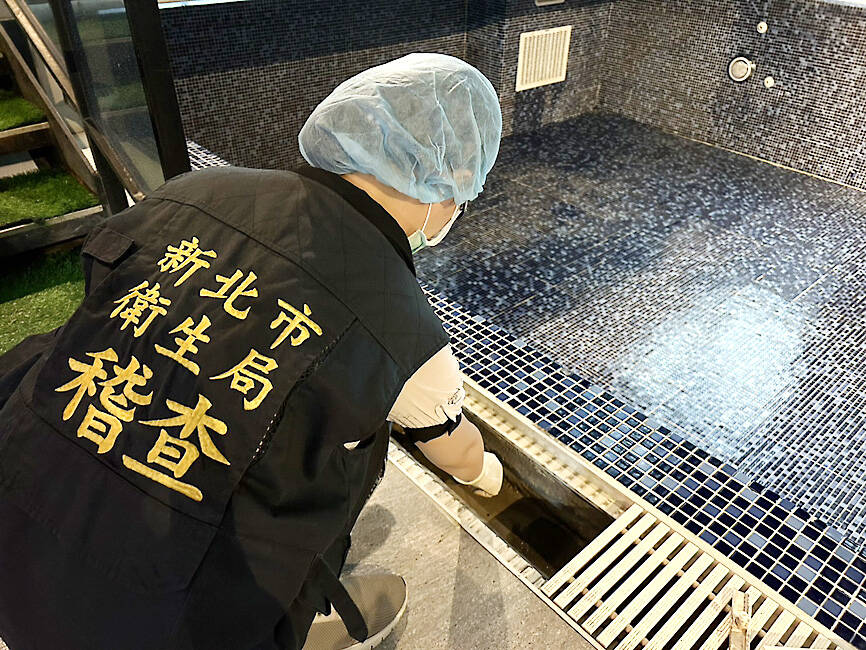No other people who visited an indoor water park in New Taipei City have reported any symptoms of deadly brain-eating amoeba infection and the monitoring has been concluded, the Centers for Disease Control (CDC) said yesterday.
In a call with reporters, CDC spokeswoman Tseng Shu-huai (曾淑慧) said the monitoring period of the 642 people who visited the water park from July 21 to Aug. 9 had elapsed on Wednesday, which means no additional cases are expected.
The group was monitored after a woman, in her 30s, apparently contracted the Naegleria fowleri amoeba during a visit to the water park on July 21, the first such case in Taiwan since 2011.

Photo courtesy of the New Taipei City Department of Health
After visiting the park, the woman sought medical attention on July 26 for symptoms including headaches, a stiff neck, fever, chills and convulsions. Her condition deteriorated rapidly and she died on Aug. 1.
The CDC first reported the case on Aug. 10.
Around that time, CDC officials took 56 water samples from 10 locations in the park, of which only one sample, taken from the park’s basement, was found to have been contaminated with the organism.
The CDC has said the contaminated sample was likely rainwater that had entered the basement, which was off-limits to the public and was unrelated to the facility’s water supply.
Naegleria fowleri is a single-cell organism most often found in warm freshwater environments such as hot springs, rivers and lakes, as it reproduces best at high temperatures up to 46°C.
Humans can become infected when the organism enters the body through the nose.
People do not get infected by drinking contaminated water.
Adding chlorine to a pool at a concentration of 1 part per million can kill up to 99.99 percent of the amoebas, the CDC said.

Costa Rica sent a group of intelligence officials to Taiwan for a short-term training program, the first time the Central American country has done so since the countries ended official diplomatic relations in 2007, a Costa Rican media outlet reported last week. Five officials from the Costa Rican Directorate of Intelligence and Security last month spent 23 days in Taipei undergoing a series of training sessions focused on national security, La Nacion reported on Friday, quoting unnamed sources. The Costa Rican government has not confirmed the report. The Chinese embassy in Costa Rica protested the news, saying in a statement issued the same

Taiwan’s Liu Ming-i, right, who also goes by the name Ray Liu, poses with a Chinese Taipei flag after winning the gold medal in the men’s physique 170cm competition at the International Fitness and Bodybuilding Federation Asian Championship in Ajman, United Arab Emirates, yesterday.

A year-long renovation of Taipei’s Bangka Park (艋舺公園) began yesterday, as city workers fenced off the site and cleared out belongings left by homeless residents who had been living there. Despite protests from displaced residents, a city official defended the government’s relocation efforts, saying transitional housing has been offered. The renovation of the park in Taipei’s Wanhua District (萬華), near Longshan Temple (龍山寺), began at 9am yesterday, as about 20 homeless people packed their belongings and left after being asked to move by city personnel. Among them was a 90-year-old woman surnamed Wang (王), who last week said that she had no plans

TO BE APPEALED: The environment ministry said coal reduction goals had to be reached within two months, which was against the principle of legitimate expectation The Taipei High Administrative Court on Thursday ruled in favor of the Taichung Environmental Protection Bureau in its administrative litigation against the Ministry of Environment for the rescission of a NT$18 million fine (US$609,570) imposed by the bureau on the Taichung Power Plant in 2019 for alleged excess coal power generation. The bureau in November 2019 revised what it said was a “slip of the pen” in the text of the operating permit granted to the plant — which is run by Taiwan Power Co (Taipower) — in October 2017. The permit originally read: “reduce coal use by 40 percent from Jan.